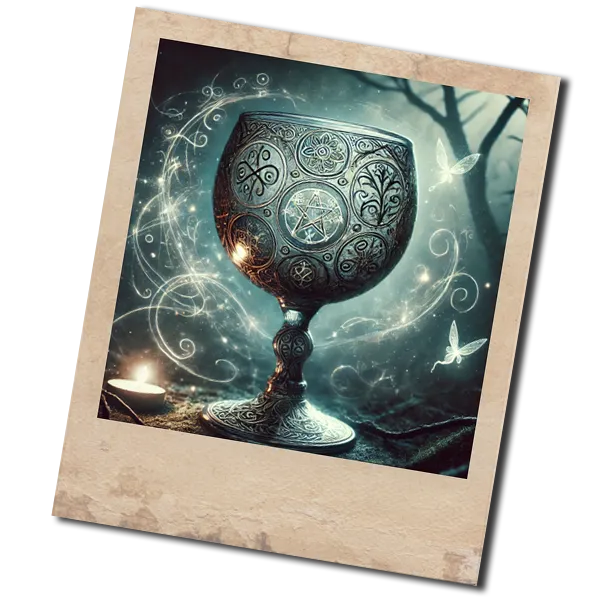The Ghost of Eden Hall: Sir Richard Musgrave’s Eternal Vigil
In Cumbria, the ghost of Sir Richard Musgrave guards the cursed goblet. What dark fate ties him to the artifact and the Musgrave family’s misfortunes?
Case File: The Ghost of Eden Hall
Case No.: EH-13C-CU
Classification: Unexplained Phenomena, Haunting and Cursed Relic
Location: Eden Hall, Cumbria, England
Date of Incident: 13th Century to Present
Filed by: Local Authorities and Historical Accounts
Status: Open, Ongoing Phenomena
Incident Summary
In Cumbria stands Eden Hall, once the grand ancestral seat of the Musgrave family, and for centuries a place bound to one of England’s most enduring legends: the Luck of Eden Hall. The “Luck” is a fragile 13th-century glass beaker of Venetian origin, passed down through the Musgraves across generations. Unlike an ordinary heirloom, this goblet carried with it a curse that shaped both the fortunes of the family and the stories of those who lived in the hall.
According to folklore, the goblet was stolen from fairies who were drinking from a spring near the Musgrave lands. When it was seized, the fairies pronounced a curse: “If this cup should break or fall, farewell the Luck of Eden Hall.” From that moment, the fate of the Musgrave family was said to rest on the survival of the glass.
Phenomena Overview
The goblet’s legend soon became intertwined with ghost stories centred on a single figure: Sir Richard Musgrave. First sighted in the 1600s, his apparition was described as tall and gaunt, dressed in dark, tattered clothing, with eyes that glowed faintly in the gloom. Witnesses claimed he appeared in the room where the goblet was kept, standing guard with grim determination.
Those who lived at Eden Hall spoke of unnerving disturbances whenever the goblet was touched or moved. Glasses clinked though none were raised, footsteps echoed in empty corridors, and doors slammed without warning. More than once, servants reported objects thrown from shelves or unseen hands tugging at their clothing. The atmosphere of the house grew tense in such moments, as though the ghost himself was warning against interference with the relic.
The most terrifying incident occurred in the early 1800s. A maid, ordered to clean the room where the goblet was stored, reached out to dust the case. As she extended her hand, she felt an icy grip seize her wrist. When she turned, she was confronted by the shadowy form of Sir Richard, his hollow eyes burning with anger. The maid fled in terror and never again returned to that part of the house.
For centuries, the ghost’s appearances were seen as portents of misfortune. Whenever tragedy struck the Musgraves, whether sudden deaths, financial ruin, or the loss of heirs in war, Sir Richard was said to appear. His presence became both a reminder and a warning: the family’s fortune hung by the fragile thread of the goblet’s survival.
Investigation and Evidence
Historical Records: References to the haunting can be found as early as the 17th century, with repeated mentions of Sir Richard’s ghost. The Musgrave family’s association with the goblet was so strong that the object itself entered English folklore as a symbol of fragile fortune.
Literary Accounts: The Luck of Eden Hall became so well known that it inspired the poet Alfred, Lord Tennyson, who wrote a poem about it in the 19th century. His verses echoed the belief that the Musgrave family’s fate was tied to the goblet, reinforcing the legend in the popular imagination.
Press Coverage: In 1905, The Times published an article on England’s haunted houses, giving prominence to Eden Hall and its cursed relic. Later, the Folklore Journal of the 1920s analysed the tale as an example of how folklore, family history, and ghostly encounters could intertwine.
Eyewitness Testimony: Servants, residents, and later visitors spoke of footsteps in the empty halls, the sound of clinking glass, and encounters with Sir Richard himself. Even after the goblet was moved, sightings of the ghost continued at Eden Hall, suggesting that the knight’s spirit remained bound to the house rather than the relic alone.
Press Coverage and Public Reaction
The Luck of Eden Hall became one of the most famous haunted relics in England. For the people of Cumbria, it was both a source of pride and unease, representing the enduring connection between folklore and family fate. Visitors came to Eden Hall hoping to see the ghost or hear the story told by those who lived there.
When the Musgraves eventually donated the goblet to the Victoria and Albert Museum in London in the early 20th century, the legend only grew. People flocked to see the fragile glass that had survived centuries without breaking. Yet even with the goblet on display far from its ancestral home, the ghost of Sir Richard was still reported at Eden Hall, as if his duty could not be transferred with the artifact.
Case Status
Final Assessment:
The haunting of Eden Hall remains unresolved. The Luck of Eden Hall continues to survive, its glass unbroken, yet Sir Richard’s spirit is said to linger in the deserted halls of the Musgrave estate. Whether he guards the goblet still or remains bound to the memory of his family’s fate, his ghost endures as one of the most striking examples of a spectral guardian in English folklore.
Concluding Remarks:
The story of Eden Hall illustrates how legend, history, and haunting become inseparable. The curse of the goblet, the ghost of Sir Richard, and the fortunes of the Musgraves together form a tale that has endured for over seven centuries. As long as the goblet remains intact, the ghost will remain part of the story, a chilling reminder of the price of stolen luck.
The Story
The Ghost of Eden Hall: Guardian of the Fairy’s Goblet
On the rolling lands of Cumbria, not far from Penrith, stands Eden Hall, once the seat of the Musgrave family and now remembered as the setting for one of England’s most enduring ghost stories. The tale begins in the 13th century, when a servant of the Musgraves encountered a gathering of fairies by a spring. The creatures drank from a goblet of delicate Venetian glass, their laughter rising in the twilight. The servant, emboldened by greed, seized the goblet and fled to his master’s hall. Enraged, the fairies uttered a curse that would echo through the centuries: “If this cup should break or fall, farewell the Luck of Eden Hall.”
The Musgraves kept the goblet, treasuring it as their most prized possession. Yet it was never regarded as a simple heirloom. It was the anchor of the family’s fortunes, and with it came the haunting of Sir Richard Musgrave, a knight of the 14th century. Fierce in life, Sir Richard seemed unable to relinquish his guardianship in death.
By the 1600s, sightings of his ghost were well established. Servants spoke of a tall, thin figure draped in tattered clothing, his eyes faintly glowing as he moved through the halls. He was most often seen near the chamber where the goblet was kept, his face fixed in an expression of stern watchfulness. The sound of clinking glass and echoing footsteps accompanied him, and his appearance was said to herald misfortune for the Musgraves.
The haunting grew darker in the 1800s, when a maid cleaning the goblet’s chamber felt an icy hand clutch her wrist. She turned to see Sir Richard’s grim form glaring at her. She screamed and fled, and the story of her terror spread through the household. No servant after her dared to touch the goblet, convinced the knight would rise against anyone who did.
For generations, Sir Richard’s appearances were linked to family disasters. Whenever a Musgrave died suddenly, fell into debt, or lost their fortune in war, the ghost was said to have been seen beforehand, pacing the halls as a spectral warning.
By the 20th century, the Musgraves relinquished their hold on the goblet, donating it to the Victoria and Albert Museum in London. The Luck of Eden Hall survives there still, a fragile relic encased in glass, its curse preserved in story rather than deed. Yet Eden Hall itself did not grow quiet. Visitors continued to report sightings of the tall, shadowy knight roaming the empty rooms, as if his loyalty was bound not to the goblet’s glass but to the memory of his ancestral home.
The story of the Ghost of Eden Hall endures as one of England’s most unnerving legends. It is a tale of stolen magic, a family’s reliance on fragile fortune, and a spirit too proud to leave his post even in death. The halls may now stand silent, and the goblet may rest far away in a museum case, but the curse and the ghostly guardian remain. Sir Richard Musgrave still walks, a reminder that some treasures are never freely won, and some guardians never sleep.





I love ALL the content you share!